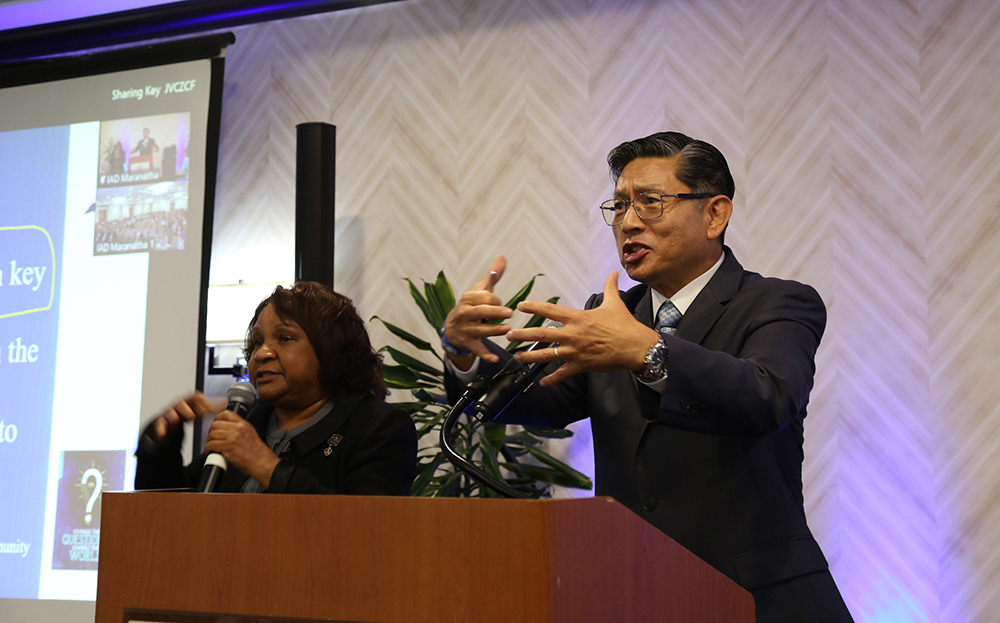Scholar Discusses the Theology Behind Adventist Community Engagement
August 3, 2023 | Miami, Florida, United States | Marcos Paseggi, for Inter-American Division News
“If we think that the Seventh-day Adventist Church is the center of the universe, we are missing the point,” said Sung Kwon, at the beginning of his July 26 presentation at 2023 Inter-American Division’s (IAD) Segment Leadership Development Conference (SeLD) in Miami, Florida, United States. Kwon, associate professor in the School of Leadership and director of the M.A. in Leadership in Social Innovation at Andrews University, told the hundreds of church leaders following the in person and online event that our emphasis must be on the kingdom of God. “We must focus on our God, who has commanded us to fulfill His engagement in our communities, which are part of His kingdom,” he said.
In search of wholeness
The gospel is a message of reconciliation — reconnecting with God, and reconnecting people with families, and neighbors, and their communities, Kwon explained. Ministry begins with a God who loves us and send us to love others. “Sometimes we are stuck in our institutional, myopic goals. We forget why we exist, and we interpret the Bible through those myopic lenses,” he said.

Sung Kwon, associate professor in the School of Leadership and director of the M.A. in Leadership in Social Innovation at Andrews University, reminds leaders to that “we mus be part of our community because our community belongs to God’s kingdom,” during IAD’s Segment Leadership Development in Miami, Florida, United States, on July 26, 2023. [Photo: Libna Stevens/IAD]
In that regard, Kwon added, when Jesus says, “I want you to be perfect as your Father is perfect,” he’s not talking about becoming a sinless human being. God wants you to be whole — in your physical, mental, social, and spiritual well-being.”
Social interactions are part of that wholeness, Kwon said. “The social aspect must be part of it. We must be part of our community because our community belongs to God’s kingdom.”
How it plays out in practice
Kwon showed how he believes there is a strong connection between Jesus’s statements in Luke 4 and the spiritual and physical endeavors of Adventist church members in their communities. “Preaching the gospel to the poor includes telling the story of Jesus and living out the story by helping the needy,” he said. “Proclaiming release to the captives includes teaching that sin’s bondage is over and fighting for freedom for all. And recovering of sight to the blind includes removing ignorance of God and providing medical help to the sick.”
He also mentioned setting free those who are oppressed, which reflects in releasing people from sin’s grasp and helping remove injustice from the world; and proclaiming the year of the Lord, which translates in instilling hope in the spiritually dead and working so human beings everywhere can thrive.
Kwon emphasized that our theology — thinking, speaking, and writing about God — should inform our faith and ethics — how we put it into practice. “We cannot just read the Scriptures without practicing our beliefs,” he emphasized. “At the end of the day, it’s not your church property what determines your presence in the community. On the contrary, your engagement in the community is your presence.”
A faithful presence of God’s kingdom
Every Adventist congregation must become a faithful presence of the kingdom of God, Kwon emphasized. “And it won’t happen automatically. We must intentionally, provisionally, and sustainably engage,” he said. “We can brag about all the church members and all the church buildings we have, but if we are not making an impact in our communities, it’s all empty words. The kingdom of God must be a reality on earth as it is in heaven.”
In that sense, Kwon emphasized that we cannot go into the community just once a year, according to our calendar of events, our public evangelism, and expect people to follow us. “People [will] say, ‘Who are you?’ You have not earned the right to preach the good news. You must build a relationship between the church and the community.”
Building relationships will change our approach and ways of relating to our communities, Kwon said. “When you see people in your community, you should not see them as potential for baptisms. You should see people as precious souls that belong to God and show a genuine concern for their well-being,” he said. “As church members, we have the mandate to become agents of transformation… We must go into our communities and transform lives.”